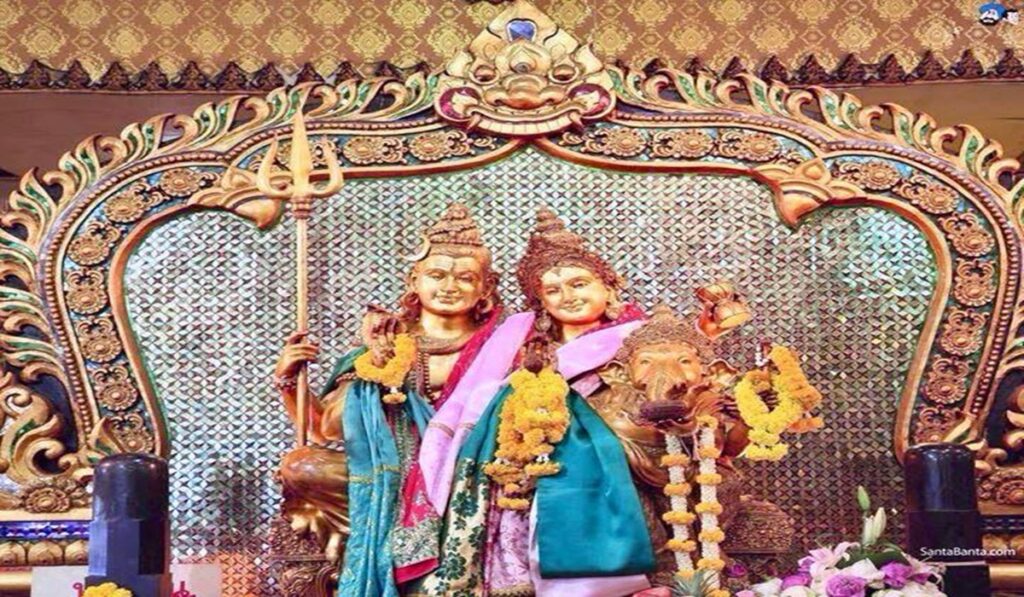Uma Maheswara Stotram Lyrics
Uma Maheswara Stotram Lyrics in English
Nama Sivabhyam, Nava Youvanabhyam
Paraspara slishta Vapurtharabhyam ।
Nagendra Kanya Vrusha Kethabhyam
Namo Nama Sankara Parvatheebhyam ॥
Nama Shivaabhyam Sarasothsavabhyam
Namaskruthabheeshta Vara Prathabhyam ।
Narayanenarchitha Padukabhyam
Namo Nama Sankara Parvatheebhyam ॥
Nama Shivaabhyam Vrusha Vahanabhyam
Virinchi Vishnveendra Su Poojithaabhyam ।
Vibhoothi Pattera Vilepanaabhyam
Namo Nama Sankara Parvatheebhyam ॥
Nama Shivaabhyam Jagadeeswarabhyam
Jagat Pathibhyabhyam, Jaya Vigrahabhyam ।
Jambhari Mukhyair Abhi Vandidabhyam
Namo Nama Sankara Parvatheebhyam ॥
Namashivaabhyam Paramoushadabhyam
Panchakshari Panjara Ranjithabhyam
Prapancha Srushti Sthithi Samhruthibhyam ।
Namo Nama Sankara Parvatheebhyam ॥
Namashivaabhyam Athi Sundarabhyam
Athyanthamasaktha Hrudambujabhyam ।
Asesha lokaika Hithamkarabhyam
Namo Nama Sankara Parvatheebhyam ॥
Namashivaabhyam Kalinasanaabhyam
Kankaala Kalyana Vapurdharaabhyam ।
Kailasa Saila Sthitha Devathabhyam
Namo Nama Sankara Parvatheebhyam ॥
Namashivaabhyam Asubapahaabhyam
Asesha Lokaika Viseshithaabhyam
Akuntithabhyam, Sruthi Samsthuthabhyam ।
Namo Nama Sankara Parvatheebhyam ॥
Namashivaabhyam Rachithabhayabhyam
Ravindu Vaiswanara Lochanabhyam ।
Rakasangabha Mukhambujabhyam
Namo Nama Sankara Parvatheebhyam ॥
Namashivaabhyam Jana Mohanabhyam
Jara Mruthi Thrasa Vivarjithabhyam ।
Janardhanabjod Bhava Poojithabhyam
Namo Nama Sankara Parvatheebhyam ॥
Namashivaabhyam Vishamekshanabhyam
Bilwachhadhamallikadhama Brudbhyam ।
Shobhavathi Santhavatheeswarabhyam
Namo Nama Sankara Parvatheebhyam ॥
Namashivaabhyam Pasupalakabhyam
Jagathrayee Rakshana Badha Hrudhbhyam ।
Samastha Devasura Poojithabhyam
Namo Nama Sankara Parvatheebhyam ॥
Sthothram Trisandhyam Shiva Paravatheebhyam
Bakthya Patethdwadasaka Naro ya ।
Sa Sarva Sowbhagya Phalani Bunkthe
Sathayuranthe Shivalokamethi ॥
॥ Ithi Shri Uma Maheswara Stotram Sampoornam ॥
उमा महेश्वर स्तोत्रम् हिंदी में
॥ श्रीगणेशाय नमः ॥
नमः शिवाभ्यां नवयौवनाभ्यां
परस्पराश्लिष्टवपुर्धराभ्याम् ।
नगेन्द्रकन्यावृषकेतनाभ्यां
नमो नमः शङ्करपार्वतीभ्याम् ॥
नमः शिवाभ्यां सरसोत्सवाभ्यां
नमस्कृताभीष्टवरप्रदाभ्याम् ।
नारायणेनार्चितपादुकाभ्यां
नमो नमः शङ्करपार्वतीभ्याम् ॥
नमः शिवाभ्यां वृषवाहनाभ्यां
विरिञ्चिविष्ण्विन्द्रसुपूजिताभ्याम् ।
विभूतिपाटीरविलेपनाभ्यां
नमो नमः शङ्करपार्वतीभ्याम् ॥
नमः शिवाभ्यां जगदीश्वराभ्यां
जगत्पतिभ्यां जयविग्रहाभ्याम् ।
जम्भारिमुख्यैरभिवन्दिताभ्यां
नमो नमः शङ्करपार्वतीभ्याम् ॥
नमः शिवाभ्यां परमौषधाभ्यां
पञ्चाक्षरीपञ्जररञ्जिताभ्याम् ।
प्रपञ्चसृष्टिस्थितिसंहृताभ्यां
नमो नमः शङ्करपार्वतीभ्याम् ॥
नमः शिवाभ्यामतिसुन्दराभ्यां
अत्यन्तमासक्तहृदम्बुजाभ्याम् ।
अशेषलोकैकहितङ्कराभ्यां
नमो नमः शङ्करपार्वतीभ्याम् ॥
नमः शिवाभ्यां कलिनाशनाभ्यां
कङ्कालकल्याणवपुर्धराभ्याम् ।
कैलासशैलस्थितदेवताभ्यां
नमो नमः शङ्करपार्वतीभ्याम् ॥
नमः शिवाभ्यामशुभापहाभ्यां
अशेषलोकैकविशेषिताभ्याम् ।
अकुण्ठिताभ्यां स्मृतिसम्भृताभ्यां
नमो नमः शङ्करपार्वतीभ्याम् ॥
नमः शिवाभ्यां रथवाहनाभ्यां
रवीन्दुवैश्वानरलोचनाभ्याम् ।
राकाशशाङ्काभमुखाम्बुजाभ्यां
नमो नमः शङ्करपार्वतीभ्याम् ॥
नमः शिवाभ्यां जटिलन्धराभ्यां
जरामृतिभ्यां च विवर्जिताभ्याम् ।
जनार्दनाब्जोद्भवपूजिताभ्यां
नमो नमः शङ्करपार्वतीभ्याम् ॥
नमः शिवाभ्यां विषमेक्षणाभ्यां
बिल्वच्छदामल्लिकदामभृद्भ्याम् ।
शोभावतीशान्तवतीश्वराभ्यां
नमो नमः शङ्करपार्वतीभ्याम् ॥
नमः शिवाभ्यां पशुपालकाभ्यां
जगत्रयीरक्षणबद्धहृद्भ्याम् ।
समस्तदेवासुरपूजिताभ्यां
नमो नमः शङ्करपार्वतीभ्याम् ॥
स्तोत्रं त्रिसन्ध्यं शिवपार्वतीभ्यां
भक्त्या पठेद्द्वादशकं नरो यः ।
स सर्वसौभाग्यफलानि
भुङ्क्ते शतायुरान्ते शिवलोकमेति ॥
॥ इति श्री शङ्कराचार्य कृत उमामहेश्वर स्तोत्रम ॥
About Uma Maheswara Stotram
The Uma Maheswara Stotram is a devotional hymn honoring Lord Shiva and Goddess Parvati, who is also referred to as Uma, while Shiva is known as Maheswara. This stotra holds significant reverence within Hindu tradition due to its deep spiritual significance. It serves as a powerful manifestation of devotion, illustrating the intimate bond shared by this divine couple, often respected as symbols of compassion, love, and cosmic balance.
In Hindu culture, Lord Shiva is the god of destruction, representing the force that dissolves the cosmos to put an end to each cosmic cycle. However, this destruction is not a negative thing; rather, it is a necessary part of the cycle of creation, preservation, and disintegration that creates space for renewal and rebirth. Shiva is a householder and the personification of austerity, meditation, and abstinence. He is married to Parvati, the goddess of fertility, love, and devotion.
Goddess Parvati represents the maternal side of the divine feminine. She is the mother of the universe, the embodiment of compassion, love, and the Shakti energy that gives the universe its power. Shiva and Parvati together represent the fusion of the feminine and male forces, the dynamic equilibrium that keeps the cosmos alive. This essence can be found in the Uma Maheswara Stotram, which praises the holy couple and seeks their blessings on spiritual development, harmony, and wealth.
The Uma Maheswara Stotram is composed of multiple passages that praise Shiva and Parvati for their cosmic roles, compassion, and other characteristics. Devotees usually recite the stotra in order to obtain spiritual understanding, ask for protection, and call upon the grace of the heavenly pair. In addition, the Uma Maheswara Stotram is recited to clear obstacles, encourage harmony in interpersonal relationships, and grant material goals that are in line with dharma (righteousness).
The Uma Maheswara Stotram prominently features the concept of the unity between Shiva and Parvati, illustrating their inseparability. They are often depicted as Ardhanarishvara, a figure that embodies both Shiva and Parvati in equal measure. This representation underscores the notion that the divine feminine and masculine are two integral aspects of a singular reality, each complementing and essential to the other. By stressing that the worship of one without the other is insufficient, the Uma Maheswara Stotram underscores the importance of harmony and balance in life.
Shiva is praised in the stotra as an all-powerful and kind god who is kind to his followers even though he is the destroyer. He is portrayed as the universe’s ruler, the abolition of ignorance, and the lord of all creatures. His love for Parvati acts as a check on his strength, demonstrating how compassion and love control even the mightiest forces in the cosmos.
